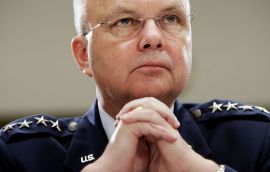Cyberwar 2.0: DARPA’s Plan X to Attack the Web
August 24, 2012
By NOAH SHACHTMAN | WIRED | AUGUST 24, 2012
The Pentagon’s top research arm is unveiling a new, classified cyberwarfare project. But it’s not about building the next Stuxnet, Darpa swears. Instead, the just-introduced “Plan X” is designed to make online strikes a more routine part of U.S. military operations. That will make the son of Stuxnet easier to pull off — to, as Darpa puts it, “dominate the cyber battlespace.”
Darpa spent years backing research that could shore up the nation’s cyberdefenses. “Plan X” is part of a growing and fairly recent push into offensive online operations by the Pentagon agency largely responsible for the internet’s creation. In recent months, everyone from the director of Darpa on down has pushed the need to improve — and normalize — America’s ability to unleash cyberattacks against its foes.
That means building tools to help warplanners assemble and launch online strikes in a hurry. It means, under Plan X, figuring out ways to assess the damage caused by a new piece of friendly military malware before it’s unleashed. And it means putting together a sort of digital battlefield map that allows the generals to watch the fighting unfold, as former Darpa acting director Ken Gabriel told the Washington Post: “a rapid, high-order look of what the Internet looks like — of what the cyberspace looks like at any one point in time.”
It’s not quite the same as building the weapons themselves, as Darpa notes in its introduction to the five-year, $100 million effort, issued on Monday: “The Plan X program is explicitly not funding research and development efforts in vulnerability analysis or cyberweapon generation.” (Emphasis in the original.)
But it is certainly a complementary campaign. A classified kick-off meeting for interested researchers in scheduled for Sept. 20.
The American defense and intelligence establishment has been reluctant at times to authorize network attacks, for fear that their effects could spread far beyond the target computers. On the eve of the Iraq invasion of 2003, for instance, the Bush administration made plans for a massive online strike on Baghdad’s financial system before discarding the idea out of collateral damage concerns.
It’s not the only factor holding back such operations. U.S. military chiefs like National Security Agency director Gen. Keith Alexander have publicly expressed concern that America may not be able to properly respond to a national-level attack unless they’re given pre-defined battle plans and “standing rules of engagement” that would allow them to launch a counterstrike “at net speed.” Waiting more than a few moments might hurt the American ability to respond at all, these officers say.
“Plan X” aims to solve both problems simultaneously, by automatically constructing mission plans that are as easy to execute as “the auto-pilot function in modern aircraft,” but contain “formal methods to provably quantify the potential battle damage from each synthesized mission plan.”
Then, once the plan is launched, Darpa would like to have machines running on operating systems that can withstand the rigors of a full-blown online conflict: “hardened ‘battle units’ that can perform cyberwarfare functions such as battle damage monitoring, communication relay, weapon deployment, and adaptive defense.”
The ability to operate in dangerous areas, pull potential missions off-the-shelf, and assess the impact of attacks — these are all commonplace for air, sea, and land forces today. The goal of Plan X is to give network-warfare troops the same tools. “To get it to the point where it’s a part of routine military operations,” explains Jim Lewis, a long-time analyst of online operations at the Center for Strategic and International Studies.
Of course, many critics of U.S. policy believe the deployment of cyberweapons is already too routine. America’s online espionage campaign against Iran has been deeply controversial, both at home and abroad. The Russian government and its allies believe that cyberweapons ought to be banned by international treaty. Here in the U.S., there’s a fear that, by unleashing Stuxnet and other military-grade malware, the Obama administration legitimized such attacks as a tool of statecraft — and invited other nations to strike our fragile infrastructure.
The Darpa effort is being lead, fittingly, by a former hacker and defense contractor. Daniel Roelker helped start the intrusion detection company Sourcefire and the DC Black Ops unit of Raytheon SI Government Solutions. In a November 2011 presentation (.pdf), Roelker decried the current, “hacker vs. hacker” approach to online combat. It doesn’t scale well — there are only so many technically skilled people — and it’s limited in how fast it can be executed. “We don’t win wars by out-hiring an adversary, we win through technology,” he added.
Instead, Roelker continued, the U.S. needs a suite of tools to analyze the network, automate the execution of cyberattacks, and be sure of the results. At the time, he called these the “Pillars of Foundational Cyberwarfare.” Now, it’s simply known as Plan X.


